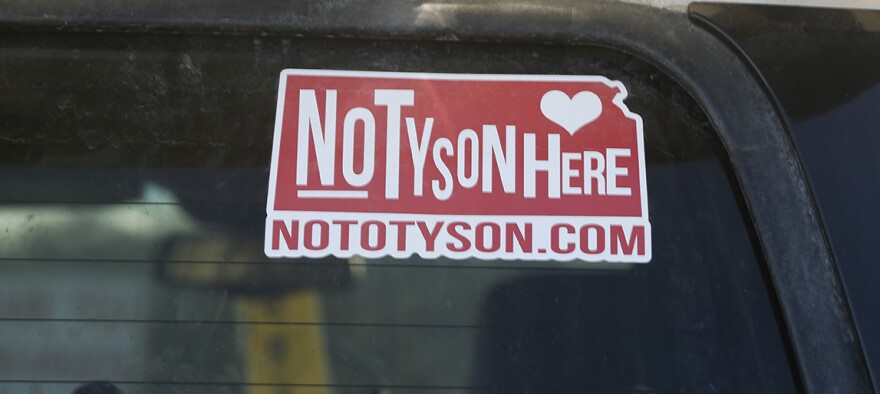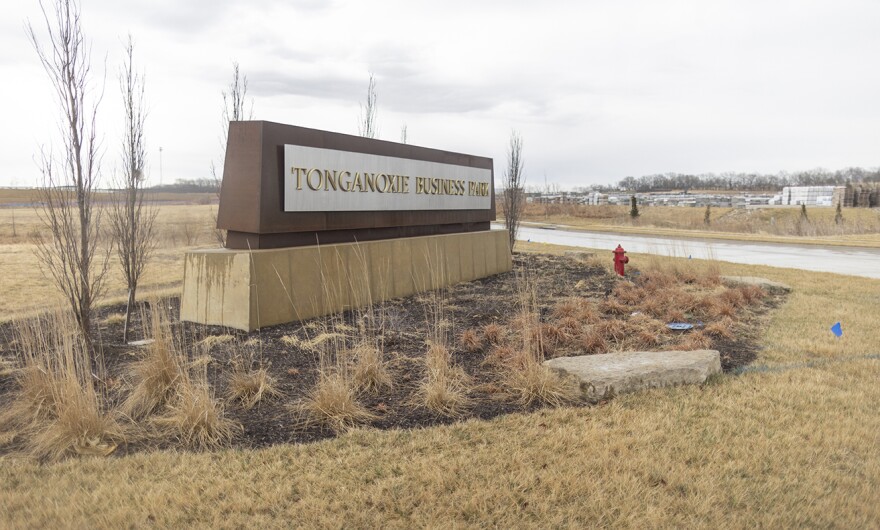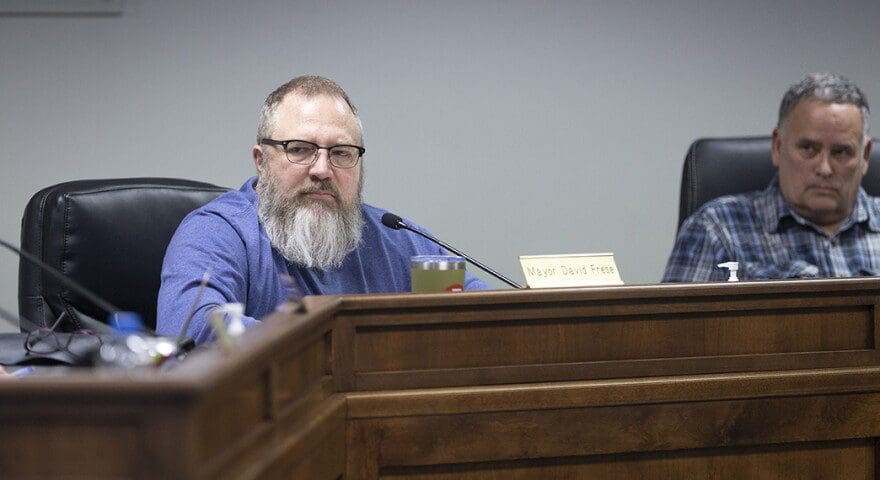Tonganoxie, Kan. — The evening of Aug. 2, 2021, was a big one for this northeast Kansas town.
The major item on the city council’s agenda? A measure to give a 10-year, 100% tax abatement to Hill’s Pet Nutrition, a Topeka-based company with plans to bring a $250 million pet-food plant — along with 80 new jobs — to the community.
The project would later be dubbed a “deal of the year” by Business Facilities magazine.
But first, the council had to hold a public hearing to let Tonganoxie residents give their input.
Mayor David Frese opened the hearing. “Is there anyone who cares to speak?” he asked.
He looked around for a few seconds. Nobody came forward.
“OK. I’m not seeing anyone who cares to speak,” Frese said, “so at this point I will close the public hearing.” The big night turned anticlimactic. A few moments later, the council unanimously approved the abatement.
That was a far cry from 2017, after Kansas and Leavenworth County officials announced another big deal — to bring a big new Tyson chicken processing plant with hundreds of jobs to the area.

Then the community erupted in a social-media driven furor, replete with demonstrations and name-calling that drove one council member to resign, saying she had received threats. Erin Brockovich, the activist and Lawrence native played in the eponymous movie by Julia Roberts, weighed in. Tyson quickly gave up on its plans, eventually locating the new plant in Tennessee. The controversy drew national attention that left a shadow over Tonganoxie that lingers to this day.
“It split the town,” says Frese, a former Kansas City Star reporter who was elected mayor after the debate faded. “I don’t think anybody really wanted it though.”
But the dustup didn’t keep Hill’s from coming to town. And while the new project wasn’t totally without opposition, it didn’t attract nearly the scrutiny or anger that the Tyson project did.
Local residents say the Hill’s project was different from its predecessor — smaller in the cultural and environmental impacts it would have on Tonganoxie, less freighted with the baggage that Tyson brought from being a widely known national company with an already-controversial reputation among some. And city officials say they learned a lesson or two about transparency from the Tyson experience that they applied to subsequent projects.
The result? Relatively smooth sailing for Hill’s — and, perhaps, an example for other Kansas communities trying to overcome their own controversies, or seeking to balance economic development against their residents’ desires to preserve the character of their own towns.
“I feel like it’s a better fit than Tyson ever would have been,” says Steve Skeet, a real estate agent who opposed Tyson. “Tyson was just not a fit for this community.”
But it’s also interesting to consider what has and hasn’t really changed. In the aftermath of Tyson, the community started talking about filling downtown storefronts and getting more strategic about economic development. And in the years after the plant’s rejection, local entrepreneurship has certainly blossomed.
In fact, the downtown business district is doing as well as anybody can remember. “I think we only have one vacant building right now. It’s been a while since that’s been the case,” says Monica Gee, owner of the Wizard of Paws pet salon and president of the Tonganoxie Business Association. “I think our economy is just good right now for our businesses. People — because of COVID — are shopping local more sometimes. That’s been a huge plus for us.”

But the community remains keenly interested in wooing big companies to town to fill its slowly developing business park and broaden the tax base to fund growing demand for community services that commuting homeowners use but can’t fully pay for with their property taxes.
So big companies remain part of the community’s growth strategy. Just not ones named Tyson.
Small town, big controversy
It’s not hard to get a sense of Tonganoxie. Just go downtown to Flashbacks, a diner owned by former fire chief Charlie “Tuna” Conrad and step inside. The walls are covered with the city’s history – trophies and pictures and hundreds of other items documenting the best of what “Tongie” has to offer. Stick around long enough, and you’ll probably get to talk to Conrad himself, and learn about the time decades ago when the city’s residents raised $500 for his ailing dad at a 10-cents-a-serving ice cream social.
“I’ll never forget it. I was a kid, and I’ll never forget it,” Conrad says. “The community came together. It pulls together when it’s the right thing to do.” He adds: “That’s who we are.”
Tonganoxie is also changing. It sits near three of the state’s largest cities – roughly 40 miles from Topeka, 20 from Lawrence, and just minutes away from the suburbs of Kansas City.
That location has fueled incredible growth: The town’s population nearly doubled during the first decade of the 21st century, from a bit more than 2,700 residents to nearly 5,000. The 2020 census showed another growth spurt, up to more than 5,500 people. That growth has brought new amenities to town, such as bigger, newer schools and a shiny new library at the entrance to downtown. But it has also brought pressures in the form of rising home prices, and unmistakable changes to the landscape: New multifamily housing developments have been built recently, the first new construction of that type in 30 years.
Longtime residents say Tonganoxie still has a small-town feel. “I like that there is a community and a sense of a town,” Gee says. “There’s a base that you want to come back to and your kids would want to come back to. You want to grow here.”
Some observers attributed the Tyson controversy to that growth: If Tonganoxie is still on the small-and-charming side, it isn’t quite as “rural” as it used to be. While most Kansas counties are losing population and looking to revive their fading fortunes, Tongie was already bustling. And the town’s newer residents, many of whom commute daily to work in Kansas City, weren’t used to having livestock or other ag operations as neighbors.
“We’ve got doctors, lawyers, media people, professionals of all kinds who live out there,” one opponent noted.
That meant many local residents weren’t quite ready in 2017 to accept an agricultural behemoth that planned to bring 1,600 new jobs to the area, with the added expectation that the surrounding countryside would fill up with chicken farms to feed the new processing plant. Local residents complained about everything from low pay — they’re still sensitive to accusations of racism that went with that — to the likelihood the new facility would produce foul odors and other environmental problems.
Others were angry that Tyson’s announcement came seemingly from nowhere, an unwelcome surprise presented almost as a fait accompli to a community that hadn’t expected it. And some people simply didn’t want a meat-processing plant as their neighbor.
“One, it was going to be across from my parents’ farm, which would have absolutely destroyed that. Two, it made no economical sense to put a chicken house between KU and Kansas City — just the demographics of this area. It made absolutely no sense,” says Skeet. He also opposed Tyson “because of their history with pollution. … I went to K-State, majored in agriculture. So I’ve never been a fan of Tyson when I knew what their practices were in the first place.”

The fight was fierce and short. It took just 14 days for Tyson to reverse course. The company tried again in Sedgwick County, only to also give up there — eventually, the new plant was located in Gibson County, Tennessee, where it not only inspires criticism but was named in a recent lawsuit alleging the company stiffed the construction firm that built the facility.
But local and company officials celebrated the prospect of the $425 million project injecting more than $150 million a year into the Tennessee economy at the plant’s opening.
“Tyson Foods has been doing business in Tennessee for nearly 50 years and we’re committed to making a positive impact on Humboldt and the entire region,” Tom McCue, the complex’s manager, said in a Tyson press release.
Back in Tonganoxie, community leaders say they came under scrutiny that hasn’t entirely gone away – although, they say, it mostly takes the form of social media complaints rather than any organized campaign like the one that fought Tyson.
“I think it has made the community more aware of what’s going on development-wise,” says Gee, who also serves on the city’s planning commission. “People are seeing it and paying attention. Prior to that, it was going with the flow.”
Differences
Tyson remains a delicate subject for city leaders, who point out that the plant was actually proposed for a site several miles outside the city limits. The project was put together by state and county development officials — Tonganoxie was directly involved mostly because it would have had to approve extending water service to the plant.
Ask what changed between Tyson and Hill’s, and you’ll get this response from George Brajkovic, the city manager: “Well. That’s a pretty loaded question because really nothing changed.”
The Tyson controversy was mostly created by outsiders and also fought by outsiders, Brajkovic suggests. “A lot of the people we heard from during the Tyson thing weren’t city residents,” he says. “They were folks who lived outside the city limits.”
The Hill’s project, meanwhile, was more directly controlled by city officials – and planned for by them. The city purchased land for the industrial park in 2009, and the council approved a strategic plan in 2016 to serve partly as a guide to the kinds of businesses they wanted to bring to town. That was always going to be a slow process – just one other big employer, Unilock, has put down roots in the park over the years – but officials say that once the Tyson controversy blew over, they stuck to the plan.
There were some other notable differences between the Tyson and Hill’s projects. Lt. Gov. David Toland, who also heads the Kansas Department of Commerce, says one big change at the state level is that the Kansas Department of Agriculture had helped shepherd the earlier project into being. When Gov. Laura Kelly, a Democrat, took office more than a year after the Tyson controversy, he says, those responsibilities shifted to his department.
“There is both art and science to the work of economic development,” Toland says. “Economic development professionals know there needs to be the right balance of community interests. There’s got to be a desire for growth in a particular community. There’s got to be the local capacity, both political and infrastructure, to accommodate growth. There’s a lot of human elements. I think what’s happened in the past is that a lot of folks looked at a map and said, ‘This is a good place for X.’”

In any event, the Tyson controversy didn’t scare Hill’s.
“Hill’s chose the site for its excellent location, access to a talented and diverse pool of workers, a strong and welcoming community, and proximity to distributors and suppliers,” Chad Sharp, plant manager for Hill’s Pet Nutrition, said in an emailed statement. “Our goal is to be a good neighbor to the community and we are committed to minimizing our environmental footprint.”
What made Hill’s a better fit for Tonganoxie? Locals say there were several elements.
Scale. Again, the Tyson plant was expected to bring as many as 1,600 new jobs to the area. The Hill’s plant, meanwhile, is a more automated affair: While the facility is plenty big — a $250 million construction project — company officials said they were bringing a mere 80 jobs to the community. The smaller number is less overwhelming to a small community.
“There’s something scalable to that,” Brajkovic says. Appropriately sized development is “always going to be a factor in a smaller community.”
Environmental impact. Tyson’s attempt to come to Leavenworth County came just a few years after the company had paid a $3.95 million settlement with the Environmental Protection Agency for alleged Clean Air Act violations at plants in Kansas, Missouri, Nebraska and Iowa — a fact widely noted in media coverage at the time. With Hill’s, Tonganoxie officials say they worked to ensure the town’s newest employer would be a good environmental citizen. The company even asked for assurances that its future neighbors be environmentally sound, officials say, to avoid potential problems that might seep into its own product.
“We’ve turned down other projects in that business park because we had environmental concerns, and that’s just in the last two years,” Frese says. “We learned a lot of lessons from Tyson. People don’t want an environmental mess. They don’t want something that stinks. They don’t want something that’s going to hurt their water.” Frese says he went to Topeka several times to walk around — and smell — Hill’s flagship manufacturing plant. “I know I’m not the only one who went there.”
Transparency. Local officials signed nondisclosure agreements while working out the Tyson deal — a normal practice, company officials said, but a source of anger when the project finally became public. “Tyson has left the local officials there in just a hell of a bind,” State Sen. Tom Holland, a Democrat, said at the time.
Since then, Tonganoxie officials have worked to increase their day-to-day transparency with the public — starting up Facebook pages and streaming council meetings on YouTube. That has made it easier for residents to follow the process, says Brajkovic, instead of “just expecting folks to show up on a Monday night.” And when Hill’s came to town, Frese says, officials tried to keep everything aboveboard. “We didn’t want to sign any nondisclosure agreements, and they honored that.”
Conrad, who opposed the Tyson plant but welcomed Hill’s, agrees. “I think that’s helped a lot,” he says, “being a little more open and honest about things.”
There were other elements. Locals have the impression that the pay at Hill’s will be higher than what Tyson was offering. (Kelly’s office said in 2021 the average annual pay at Hill’s would be around $60,000.) And Hill’s is a Kansas-based company — increasing community members’ direct knowledge and comfort with the business. “People could go to Hill’s without getting on a plane,” Frese says.
Skeet agrees. “It’s not like a company that’s out of state that’s going to go to a state and ruin it and then pull out and never go back,” he says. “I mean: They’re from here.”
Looking ahead
The Hill’s project ended up passing smoothly, but that doesn’t mean the legacy of the Tyson controversy has ended. “I think the Tyson thing brought us together a little more,” Conrad says. “The negative that came out of it is that people think they can oppose anything now.”
City officials are also more aware these days of social media criticism, and how it can affect their jobs. That’s not always comfortable or welcome. “I’ve dumped all of my Facebook accounts, hard delete of them,” Frese says.
One thing is for sure, though: There will be more big economic development projects coming to Tonganoxie. There has to be. City officials need to fill up the business park for several reasons. They need to provide jobs for the growing community — people who work out of town often spend a lot of their shopping dollars out of town. And somebody needs to pay for the new city services made necessary by the growing population.

“Rooftops do not bring money to take that tax burden off,” Gee says. “Businesses and industries will.”
Frese, meanwhile, hopes that economic development can help Tonganoxie preserve its character and control its own future instead of getting run over by the growth of nearby cities. “If we don’t establish our identity and our own financial independence, I think we will lose that rural feel,” he says.
That means learning the lessons of the Tyson controversy, and applying them to future projects. Nobody wants to endure that acrimony again.
“I got in a fight with a kid back home 100 years ago. And my dad said, ‘That’s fine if you want to fight, but you got to understand your mom and I have to live here,’” Frese says. “And I think of that every day. … You can say what you want, but at the end of the day, we have to live with each other. We have to get along.”
A version of this article appears in the Summer 2022 issue of The Journal, a publication of the Kansas Leadership Center. To learn more about KLC, visit http://kansasleadershipcenter.org. Order your copy of the magazine at the KLC Store or subscribe to the print edition. Both the Kansas Leadership Center and the Kansas News Service get significant funding from the Kansas Health Foundation.













